There are many ways to continue learning after college, such as acquiring new skills independently, joining online groups or courses, and taking advantage of employee training. In any case, learning after college is a fantastic idea as it can help you retain sharp cognitive functions, become a better professional, and improve mental wellness—and besides, you will never get bored!
But how long should you continue to learn after college? The best answer would be to commit to a lifelong learning mindset. This way, you will avoid intellectual stagnation and never stop growing as a person.
In this article, our team will discuss how to keep learning after college. Here, you’ll discover:
- Lifelong learning definition and benefits
- Steps to discovering new interests after graduation
- Best ways to learn new skills
- Approaches to boosting motivation for learning
🧬 Importance of Lifelong Learning
We are always learning. Whenever you decide to start a new hobby, learn a foreign language, or improve an existing skill, you make your brain work and develop.
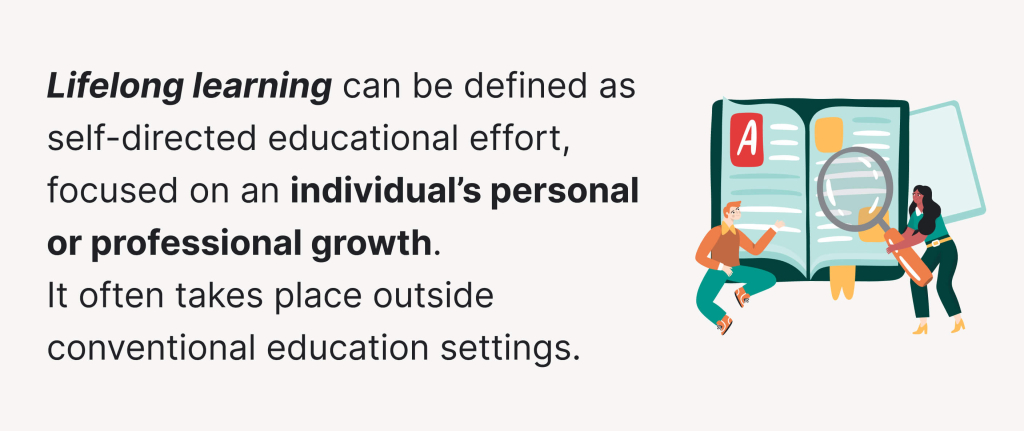
According to studies, the main task for adult learners is to keep a positive attitude toward new material throughout their lifespan. This way, you can avoid intellectual degradation.
- Learning for Yourself. Studying something for the sake of self-development is a critical activity for every adult. You’re improving your self-confidence and developing a healthy sense of self-worth by discovering new things and mastering new skills. You can also achieve personal fulfillment this way and avoid intellectual stagnation.
- Learning for Your Profession. Career-related learning is also a vital activity you should engage in throughout your life. Ongoing professional development allows you to become an expert in your field.
Changes in Your Brain When You Acquire a New Skill
You might be surprised to find out that your brain undertakes a tremendous amount of work to learn a new skill or fact. It forms new neurons and fortifies the existing neural pathways in the process of development and upgrade. This way, you train your brain’s neuroplasticity – a vital property that helps improve your cognition and memory.
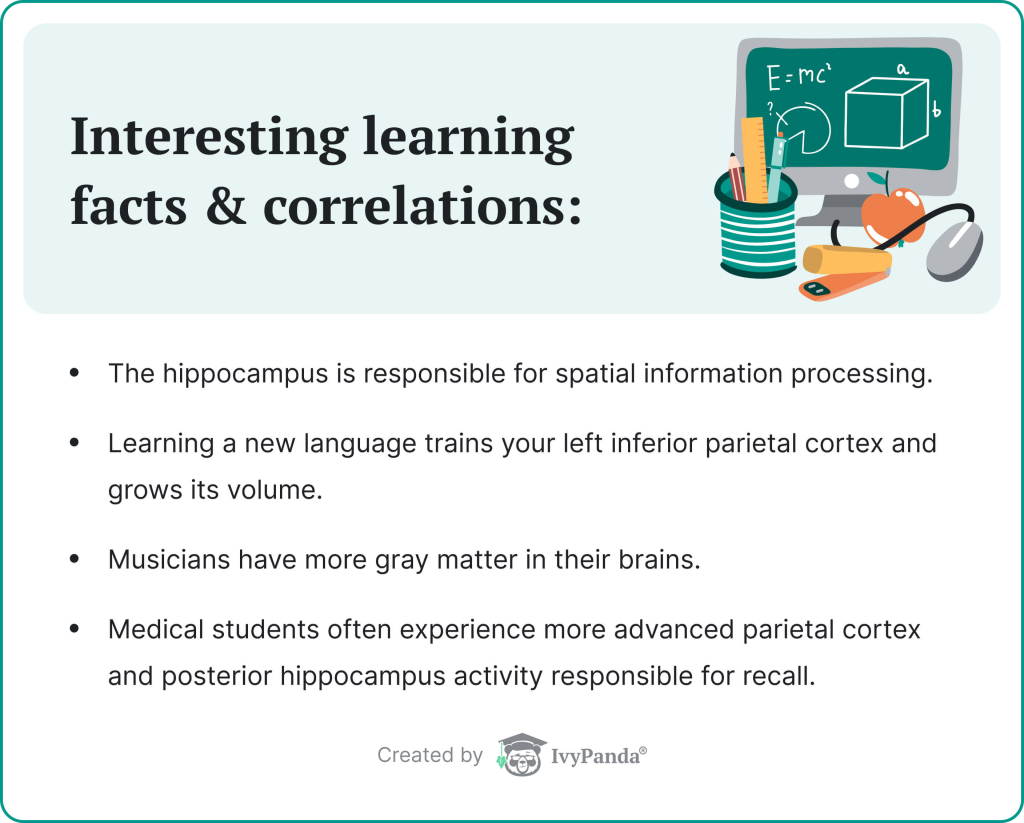
We used to believe that the human brain stops developing after 25 years of age, but recent findings suggest the opposite. Thus, you can arrange a healthy workout for your brain by acquiring new skills, repeating what is known, and practicing a new skill.
Other notable brain changes include:
- Dopamine release. Learning new things excites you, which manifests in elevated dopamine levels. As a result, you feel happy and can even grow addicted to new knowledge.
- Myelin growth. Myelin is a connective tissue in the brain that ensures the speed of neural signal processing. By learning new things, you increase the neurons’ connectivity. It encourages a faster and better memory.
📚 7 Reasons to Continue Learning After College
Now that you know the importance of lifelong learning, you must be motivated to adopt this mindset and embark on a journey to new knowledge. However, we still have not discussed all benefits of this approach.
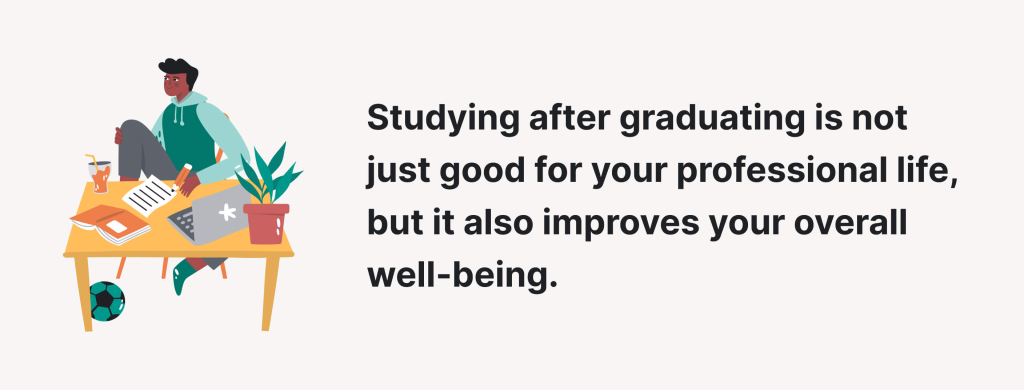
Let’s talk about the reasons that might drive you to lifelong learning.
- Climbing the career ladder and changing careers. Professional training allows you to become a better expert in your field, assume new tasks, and take on leadership positions in the workplace. You have better chances for a promotion if you complete training courses. You will also benefit from getting advanced qualifications in line with modern demands.
- Increasing your motivation and confidence. Research proves that people feel much more self-confident and motivated if they’re exposed to positive learning experiences. Your brain remembers those successes.
- Becoming a problem-solver. When you encounter new challenges while studying, you exercise your problem-solving muscle. You learn to find original solutions and approach different problems from various angles.
- Improving your brain capacity and wellness. Learning is directly linked to brain health, ensuring vitality, longevity, and overall well-being. People focused on studying may be more eager to adopt healthy habits and engage in regular physical exercise.
- Getting a salary rise. Better qualified employees consistently earn more than mediocre staff. So, your salary is in your hands. If you undergo professional training and grow your skills, you have a higher chance of securing a lucrative pay rise than your less proactive colleagues.
- Finding useful connections. You can meet fellow learners through online and offline educational courses. There is a good chance you will connect with new people interested in professional networking. In addition, you may encounter individuals with whom you can pursue mutual hobbies.
- Realizing what your potential and interests are. You’ll never know what you are incredible at if you don’t try new things. If you give things a go, it’s much easier to clarify your life’s purpose, what interests you, and what sparks joy.
Risks If You Stop Learning Something New Every Day
Intellectual stagnation is hazardous for your mental and physical health. As soon as you stop dedicating time to continued learning, you can experience a sizable reduction in your quality of life. The benefits of lifelong learning are simply immense!
As a rule, the following aspects of your life will suffer the most due to insufficient learning.
- Life Satisfaction. People can reach new heights by addressing intellectual challenges. It brings them to a new level of life satisfaction. If you don’t experience the thrill of victory, you’ll hardly feel satisfied with your quality of life.
- Self-Confidence. Self-assurance grows as we get more competent and knowledgeable about various topics. The opposite process takes place if we stagnate in our development.
- Positive Impact on Others. It’s impossible to inspire others if you don’t possess impressive knowledge and intelligence. To become a role model or motivator, you should work on yourself constantly.
- Decision-Making. You’re sure to make better decisions when you learn new things daily. This way, you include more variables in the equation. Yet, this skill reduces if you don’t expose your brain to new information.
- Creativity. Regular learning boosts our creativity by expanding our horizons and providing original solutions. The human brain builds new connections and finds alternative answers with the new data input.
🗝️ How to Keep Learning After College: Key Steps
Obviously, resuming an active educational process after graduation is likely to be tricky. Your brain will look for excuses from the start. It will attempt to convince you to drop that challenge altogether.
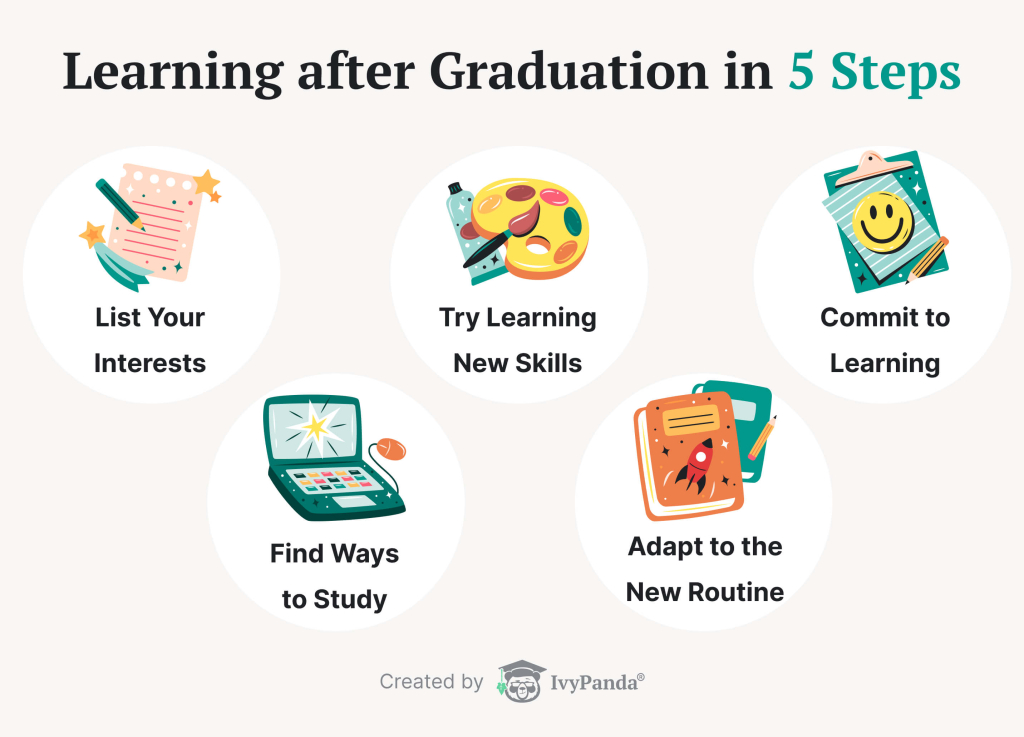
How can you help yourself adapt to a new lifestyle? Check these steps for systematic, determined learning of a new skill.
Determine Your Interests and List Them
The first success in transitioning to a lifelong learning mindset is to understand what really interests and excites you. The easiest way to come to grips with your passions and aspirations is to create a list:
- Write down things that make you smile.
- Add skills you want or need to learn for personal and professional growth.
It’s much simpler to schedule a change with tangible tasks and goals at hand. A neatly written list will create a visual stimulus for you to go on.
Find Ways to Study Your Activities
Setting a goal moves you halfway to its achievement. Still, you need to plan the practical steps to achieve the intended outcomes.
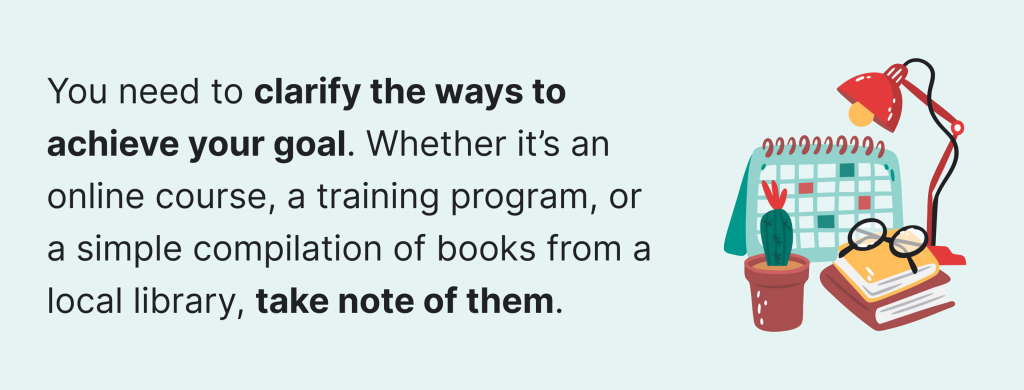
It’s good to be realistic at this stage. For instance, you may master cooking a delicious pie with a free YouTube video. It is more productive than dreaming of an expensive course in Paris that you can never afford.
Read Specialized Literature
Reading is a brilliant habit on its own. What’s more, it can help you solve a range of learning-related tasks. Besides acquiring new knowledge or particular skills, the reading process helps:
- Train your brain. No matter what you read, the brain has to memorize the content and process the consumed data. Thus, you’re doing a healthy brain workout when studying new things through text.
- Improve concentration. Attentive reading is a valuable skill we should practice today amid information overload. You may find it hard to concentrate at first. Yet, it pays off if you train yourself to focus on careful, in-depth reading instead of scanning through the headlines.
- Advance your general knowledge. Whatever you read is processed visually and cognitively, staying in your memory. You become a more intelligent and educated person day by day.
- Improve literacy. Even general reading materials are full of unknown words and sophisticated vocabulary. So, you’re exposed to plenty of chances to learn new words and become more literate.
- Enhance your sleep quality. A paper book is a fantastic investment in a good night’s sleep. Read a printed copy before bed to calm you down and prepare your nervous system for falling asleep. Reduce screen time by abandoning e-books or materials downloaded to your smartphone.
Take an Online Course
If you’re unsure about the skill that you want to master, trying some free online courses may be a good idea.
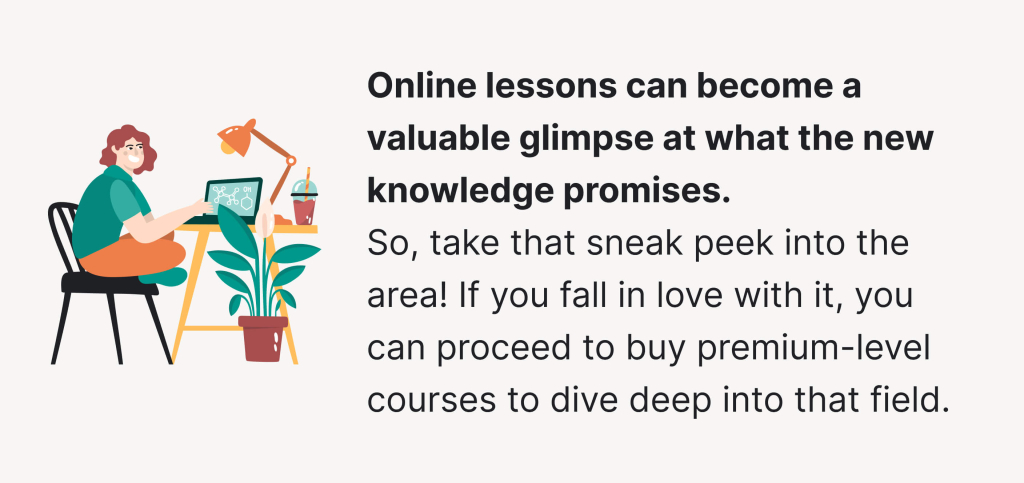
The Internet is full of free courses from renowned tutors and institutions. Here are a couple of reputable, well-known resources you should try out:
- Coursera. It’s a US-based database of free-access courses on various subjects. You’ll find 3,000+ lessons at no cost to master a new skill and clarify your genuine interest.
- Udemy. It’s a database of 200,000+ courses available free of charge or for a reasonable fee. The collection covers dozens of categories, from music to IT to lifestyle to photography. So, you’re sure to find something to your taste and preference.
- edX. It’s a massive repository of free and paid courses from the world’s well-known institutions, like Harvard, Berkeley, and MIT. Over 160 member universities contribute their flagship courses to this database to deliver top-tier tech education to students across the globe.
Learn in the Workplace
If you want to develop your professional skills or master new competencies, you can do that right in your workplace. Luckily, today, companies encourage employee training. Bosses and managers try to provide various learning opportunities in-house to grow their staff and enhance organizational productivity.
So, here’s what you can do to combine learning and work:
- Talk to your supervisor. Generally, managers are better informed about in-house training opportunities than you. They can match you with a course or program to your liking.
- Partake in collaborative tasks. If such initiatives are absent in your workplace, you can suggest a collaborative program. It will enhance experience sharing among staff and boost learning from more experienced colleagues.
- Engage in volunteering. Many companies have volunteering programs to assist workers with expertise development. So, you can invest some time and effort to reap the immense benefits of this experience. If your skills are insufficient for a job, close that gap with volunteering.
Join an Offline Class
Some individuals resist online classes as they can’t organize self-paced learning and need face-to-face scaffolding. If you’re one of them, attending locally held lectures and workshops will be a great way to learn new things.
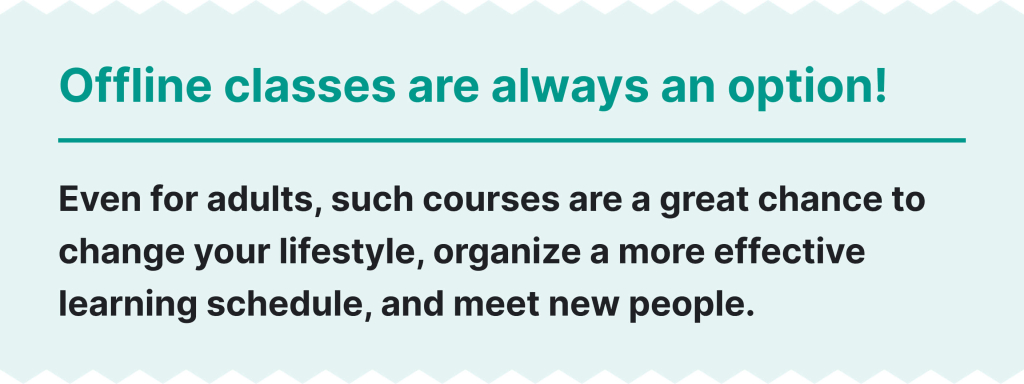
Get into a Discussion Club
It’s easier to hone a new skill if you engage in intellectual discussions and problem-solving related to it. An ideal solution for such a lifelong learning direction is to enroll in a local discussion club. This way, you’ll be able to talk to real people; both acquire and share information.
☝️ You can join a virtual book club or an online discussion group at Discuss.io if such resources are lacking in your neighborhood.
Listen to Podcasts
Educational podcasts are also a workable strategy to keep your brain geared toward studying. You can listen to them during other activities or during your commute. It’s also a perfect solution for people who don’t like socializing with others. Try this method as a flexible, pocket-friendly learning strategy that’s always with you.
Consider Learning Entirely New Skills
Even with a long list of interests and hobbies, consider starting something new. Challenging yourself this way is always a good idea since you can try unusual activities and diversify your routines.
Some workable examples of such radical steps are:
- Learning a new language (preferably exotic).
- Playing a musical instrument.
- Studying new words to enrich your vocabulary.
- Starting a new project (startup or hobby).
- Acquiring a valuable everyday skill (e.g., cooking pies or cutting things from wood).
All of these skills will do you a good favor in terms of life motivation, interest in original activities, and brain training.
Fit Your Learning Sessions into Your Routine
Targeting a new skill or study course is a great move ahead. However, it’s vital to approach the task with sobriety and realism.
- How can you cover a complex programming course if you work two jobs?
- Is it possible to graduate when you have three kids at home?
- Will you be able to finish an expensive study course if you have a pending project with a strict deadline at work?
All these life responsibilities can get in the way of a learning project and kill your motivation. Thus, we advise careful planning. Reserve at least 15-20 minutes daily for the new skill for starters. If you realize that you have more time, you can always increase the time for learning as you go.
Commit to Learning!
Finally, making an official commitment is a sure way to stick to your plan and not give up on the first day. By organizing the process how we’ve instructed you to, you have all chances to succeed.
Besides, here is a list of free online books and resources for studying!
💪 6 Ways to Find Learning Motivation upon Graduation
Sticking to the plan is usually difficult, even when you have realized the importance of lifelong learning. You may come home tired after work and postpone studying day after day. If you do this way, your project may never start.
☝️ The thing is:
You may not suffer from a lack of time or energy. In most cases, it’s the lack of motivation that makes you stagnate.
Here are six workable ways to boost your motivation and keep it high during the whole process of learning.
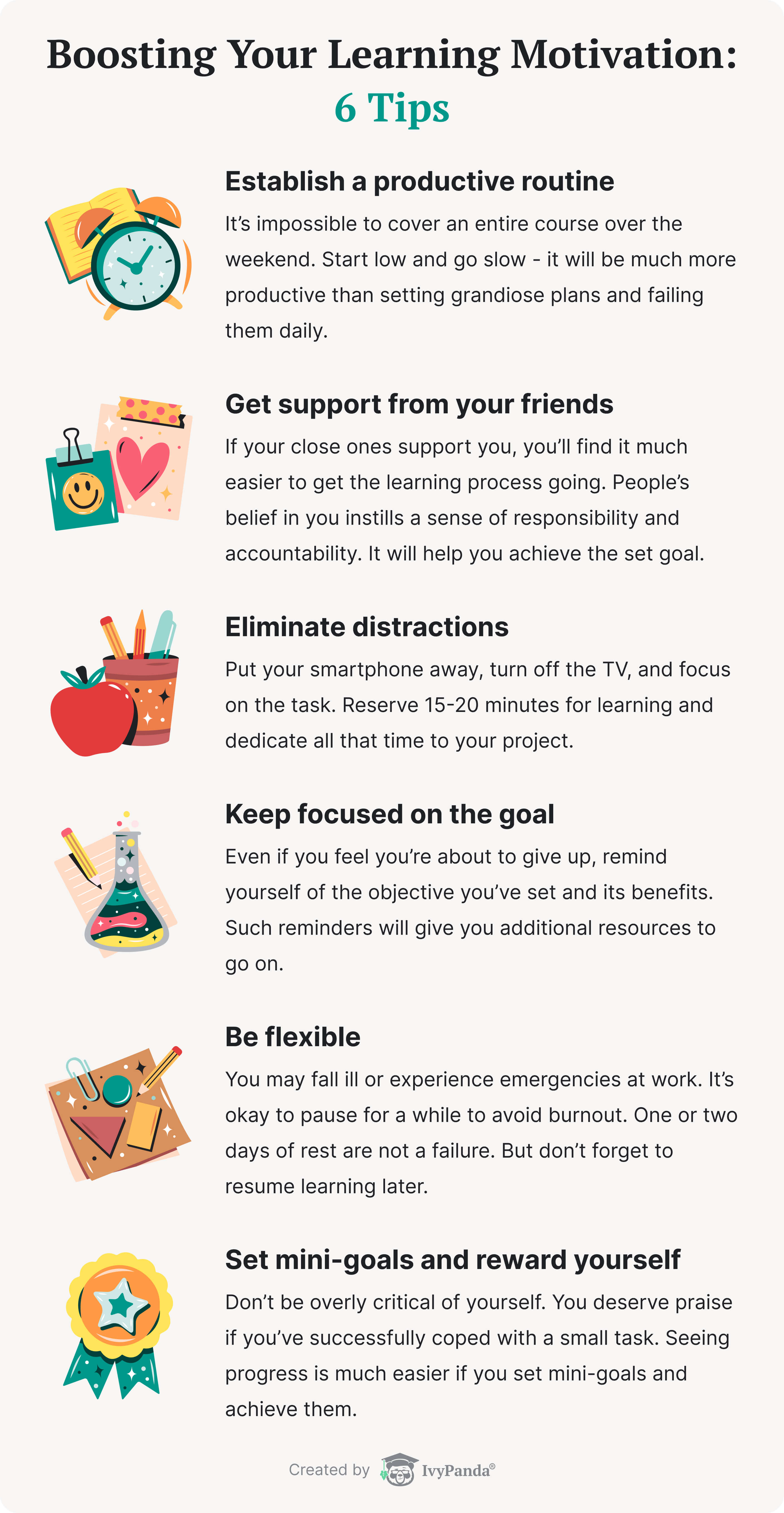
📌 Final Thoughts
As you can see, learning is significant at all levels of your functioning.
- You risk becoming irrelevant and obsolete as a professional if you are resistant to change.
- In personal terms, you risk eroding your self-esteem and failing your fulfillment plans if you stop learning.
It’s hard to enjoy life and have a high-quality, satisfying lifestyle if you degrade intellectually and professionally. That’s why we recommend reserving time for self-growth even amid hectic routines. This investment will pay off at any age with higher self-confidence, better motivation, vitality, and brain health.
Thanks for reading this article. If some of your friends or relatives need help boosting motivation for lifelong learning, send them this article!
🔗 References
- The Importance of Lifelong Learning – Penn LPS Online, the University of Pennsylvania
- Neuroplasticity: How Experience Changes the Brain – Kendra Cherry, VeryWell Mind
- The Many Benefits of Lifelong Learning – Walden University
- If You Fail to Learn, You Risk Becoming Irrelevant – UNC Kenan-Flagler Business School
- 6 Reasons Why Continuing Education Is Important – Western Governors University
- 10 Effective Study Tips and Techniques to Try This Year – USAHS, the University of St. Augustine for Health Sciences
- Studying 101: Study Smarter Not Harder – Learning Center, the University of North Carolina at Chapel Hill
- 10 Good Reasons for Continuing Education – The College of Health Care Professions




Loved the article! So much good information. Keep up your good work 🙂 Dede
Thanks for your kind words, Dede! We look forward to seeing you again!